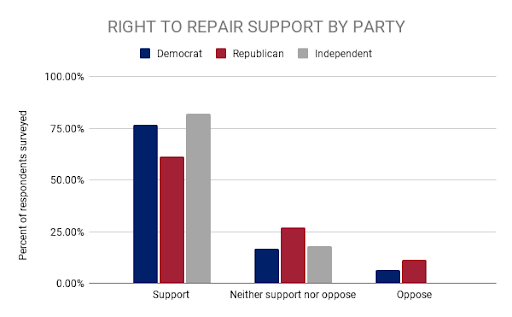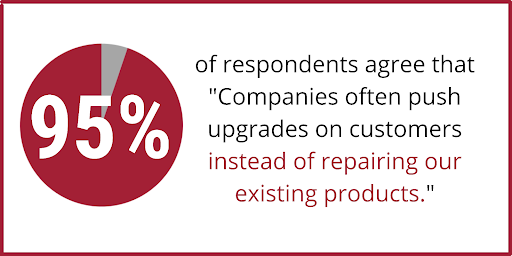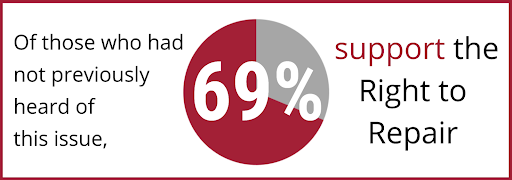
Sander Kushen
Former Consumer Advocate, CALPIRG
New survey data collected by CALPIRG confirms what we’ve known for a long time: Right to Repair is something we can all agree on.
Former Consumer Advocate, CALPIRG
Imagine spilling coffee on your phone, or cracking your screen, or just getting some gunk under one of the buttons. Not great, but accidents happen! Now you just need to get it fixed.
If this sounds familiar, you may also recall a needlessly difficult process to fix your device. You may have encountered manufacturer-imposed restrictions on tools and repair parts, which limited your options. This is common, and it forces consumers to go to a “manufacturer- authorized” servicer, which leads to higher repair costs and, infuriatingly, often the need to just buy a completely new device.
It turns out that Californians are fed up with this. According to a recently conducted survey, a vast majority of Californians support the “Right to Repair,” a movement that aims to fix this broken system.
Right to Repair laws would require manufacturers of electronic devices, appliances, agricultural equipment and medical equipment to make repair information, parts, tools and software available to consumers and independent fixers. This means lower costs, more competition in the repair market, and fewer headaches. It also means fewer devices being trashed, and less toxic e-waste.
1. A bipartisan majority of Californians support laws that expand the Right to Repair.
Of all respondents, 75% support the Right to Repair, including 76.64% of Democrats, 61.36% of Republicans, and 81.97% of Independents. Only 5.66% of all respondents oppose the Right to Repair.

2. 95% of respondents agree that companies often push upgrades on customers instead of repairing existing products
While the majority of all Independents, Democrats, and Republicans all support Right to Repair, there’s also general consensus on the basic problem: Companies will prioritize “selling new” instead of repairing existing products. This simple statement has devastating implications for consumers (higher prices), independent repair shops (restricted access to repair parts), and the environment (more unnecessary e-waste).

3. 69% of respondents without previous knowledge of Right to Repair support it after learning what it means.
While the feelings of frustration and helplessness when trying to fix a broken device feel universal, 45% of survey respondents had not actually heard of Right to Repair before taking the survey. Once this group learned about the issue, they overwhelmingly supported Right to Repair.
This confirms the nearly-universal appeal of Right to Repair: Those with no knowledge of the issue quickly support it once they learn what it means.

4. 58% of respondents indicate would be more likely to vote for candidate if they support Right to Repair
Most respondents also indicated that this support would affect their vote at the ballot box: 58% say that they would be more likely to vote for a candidate if that candidate supports Right to Repair. While only 6.6% would be less likely to vote for that candidate.
With the majority of Californians in support of Right to Repair, this is an issue that our legislators should prioritize.
In California, one legislator doing just that is Senator Susan Talamantes Eggman (Stockton), who has introduced SB 983 to give Californians what they need to fix electronics and appliances and keep them off the scrap heap.
But the momentum surrounding this issue goes beyond California. Over the summer, President Joe Biden signed an executive order calling for the Federal Trade Commission to prevent manufacturers from restricting people from fixing their own equipment and devices. Manufacturers have made a variety of arguments defending their repair restrictions including: proprietary information, trade secrets, safety, security and even environmental protection. These arguments were repeated during the hearing, but a 2021 unanimous Federal Trade Commission report found “scant evidence” justifying repair restrictions.
I have a feeling that as more people hear about these efforts and new laws, the support for Right to Repair will only increase. As that happens, CALPIRG will be there to continue the fight for our right to fix our own things.
Footnote on Methodology: CALPIRG conducted this survey via Survey Monkey with a sample of 212 Californians. More details on data collected and questions asked can be found here.
Former Consumer Advocate, CALPIRG